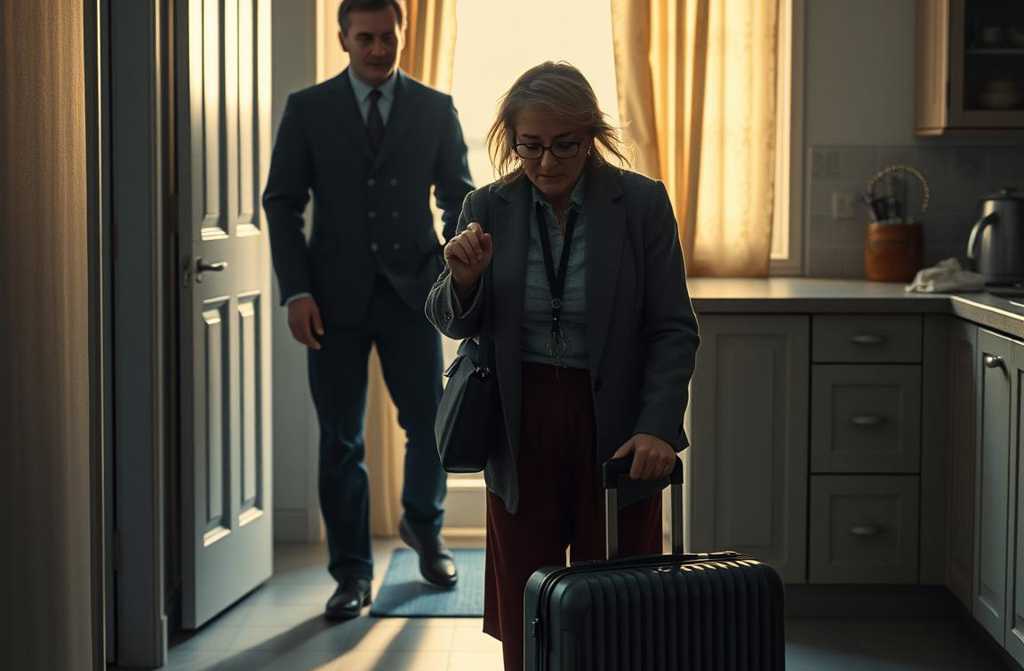In the morning, her suitcase sat in the hallway.
“Valerie…” began John.
“Dont,” she cut him off. “You made your choice. Now Im making mine.”
The door slammed. John was left alone.
He sat at the kitchen table, poking listlessly at his cold shepherds pie with a fork. Half past six. Valerie was already an hour and a half late.
The telly in the corner droned on about another political scandal, but John wasnt listening. His gaze drifted over the familiar details: the yellow curtains with daisies Valerie had hung five years ago, his worn slippers by the fridge, her knitted cardigan draped over the back of a chair.
Everything in its place. Except the woman who belonged there.
The front door clicked. Finally.
“Johnny, Im so sorry!” Her voice was tired. “Dad took illwe had to call an ambulance.”
John winced. Those old folks again.
Valerie stumbled into the kitchendishevelled, eyes red from crying.
“What happened?” he asked, not looking up from his plate.
“His blood pressure spiked. The doctor said he needs constant monitoring…” Valerie flopped onto the chair opposite. “Mum was beside herselfdidnt know what to do.”
“Dont they have a phone? Cant they call an ambulance themselves?”
Valerie flinched as if hed struck her.
“John, theyre in their seventies. They were scared. And theyre my family.”
“And what am I? Not family?” John set down his fork and glared at her. “No one home, dinners cold. I come back from work, and youre”
“Im sorry,” she murmured, reaching for the stove. “Ill heat it up.”
But irritation had already spread through him like a warm, bitter tide. Once, shed met him at the doorhanded him his slippers, asked about his day. Now it was always her parents.
Valerie moved quietly around the kitchen, shoulders slumped, hands trembling as she shifted pans. John watched the back of her head, remembering how she used to turn to him with a smile.
When was that? A month ago? Two?
“Look,” he said, softening his tone, “maybe they really do need a carer. Theyve got decent pensions, havent they?”
Valerie froze, ladle in hand.
“Decent? John, Dad gets £800 a month, Mum gets £600. Half of that goes on meds and bills!”
“£600?” John frowned. “She worked her whole life!”
“As a primary school teacher in a village.” Valerie turned to him. “John, you know this.”
He didnt. Hed never paid much attention to his in-laws finances. His own parents had died a decade ago, leaving him their one-bed flat, which hed sold straight away. Valeries folks? He saw them at Christmas.
“Then hire someone part-time,” he suggested. “For cleaning, cooking.”
“With what money?” Her voice sharpened. “Did you not hear me? £1,400 between them!”
John shrugged. Hed never bothered calculating other peoples expenses. He and Valerie were comfortablehis engineering salary, her private English tutoring. No luxuries, but no worries either.
Outside, the sky darkened. Valerie set a reheated plate in front of him and sat down. She didnt eatjust propped her chin on her hand and stared at the table.
“Val,” he said gently. “I dont mind helping. But you cant abandon our home.”
“Abandon what home?” She lifted her eyes. “Are we even a family?”
The question hung in the air.
John chewed slowly, thinking. Family? Well, yes. Though theyd never had kids. Valerie couldnt, and adoption had always felt like too big a step. So theyd settled into a quiet, steady rhythmjust the two of them.
“Of course were family,” he said at last.
The next few weeks were pure tension.
Valerie was at her parents every other daydoctors appointments, errands, cleaning. John came home to an empty flat.
Dirty dishes in the sink, unmade bed, leftovers in the fridge.
“I cant do this anymore,” he said one evening. “The house is falling apart.”
“What exactly is falling apart?” Valerie sighed, dropping a bag of laundry. “Forgotten how to cook? Wash a plate?”
“Its not about that.”
“Then what?”
John had no answer. It wasnt the chores. It was that hed grown used to being the centre of her world. Now that centre had shifted.
“Theyre not children,” he tried. “They managed without you before.”
“Mum fell in the bath yesterday. Lay there for two hours until I arrived.” Valerie flung the bag down. “What, should I have left them?”
“Hire a carer!”
“With what money?” she shouted. “What money?”
They stood in the kitchen, yelling for the first time in fifteen years of marriage.
Valerie wept, tears streaking her cheeks. John felt something twist inside him.
“John, do you hear yourself?” Her voice shook with anger. “Theyre my parents! My father! My mother!”
“And what am I?” John exploded. “A lodger? A flatmate?”
“Youre my husband! But they”
“But they come first!” he snapped. “I get it! Fifteen years we were fine, and now suddenly you remember your duty!”
Valerie recoiled as if struck.
“How can you say that? John, theyre old, theyre ill”
“And Im what, thirty?” he barked. “Im tired too! I want to come home to a wife, not a ghost!”
“So I should abandon them? Let them rot alone?”
“I didnt say rot! But theyve got moneyhire help!”
“What money?” she cried. “Do you know what carers charge? £20 an hour! At least!”
John faltered. Hed never priced such things.
“Well… maybe not every day. An hour a day…”
“An hour?” Valerie laughed bitterly. “John, listen to yourself! Clean, cook, wash, shopall in an hour?”
“I cant take this anymore!” John slammed his fist on the table. “I cant watch you leave me every damn day!”
The words spilled out before he could stop themand he knew. It wasnt the chores, the cold dinners, the mess. It was the fear of losing her. The terror of being alone.
Valerie stared at him, wide-eyed.
“So its not about money,” she said quietly. “Youre jealous. Of my own parents.”
“Im not jealous!” he snappedthough he knew she was right. “I just… I want my wife back!”
“And if your parents were alive?” she asked. “Would you abandon them?”
John opened his mouth. Closed it.
His parents… If theyd lived this long, hed have helped. Probably.
But this was different!
“My parents are gone” he began.
“Mine arent!” she shot back.
“Right,” he said coldly. “No more visits. And if you want to help financially£50 a month max. Thats enough for a carer twice.”
“What?”
“No more visits. No more than £50. Thats final.”
Valerie stood in the middle of the kitchensmall, rumpled, tear-streaked. She looked at him as if seeing him for the first time.
“Youre forbidding me,” she said slowly. “A forty-year-old woman. From helping her dying parents.”
“Val”
“£50 a month,” she continued, voice hollow. “Two carer visits. One hour each. So four hours of help a month. The rest of the time, they can starve? Live in filth?”
She fell silent. Wiped her tears. Studied him a long moment. Then turned and walked out.
In the morning, her suitcase sat in the hallway.
“Valerie…” John began.
“Dont,” she said. “You made your choice. Now Im making mine.”
The door slammed. John was left alone.
The first few days felt oddly pleasant. No nagging about socks on the floor. Football on telly till midnight, eating straight from the pan. Freedom.
But by weeks end, it was clear this wouldnt do. John found a cleaner through an ada woman in her forties, Linda, who came twice a week. £200 a month.
“Wheres the wife?” she asked once.
“Split up,” John replied shortly.
Linda tutted sympathetically and scrubbed the sink.
News of Valerie came in scraps. A neighbour spotted her at the GPs with an elderly manher father, presumably. A colleague mentioned seeing her at the theatre with some bookish bloke.
Then the divorce papers arrived.
The news of her remarriage came from that same neighbour, delivered with barely concealed glee:
“Your Valeries married again. Some doctor, they say. Widower, kids and all.”
John nodded and shut the door. Sat on the sofa, staring at the ceiling.
So shed found a new family. With children. He wondered how she managed.
The years slid by. Linda came like clockwork. John worked, watched telly, met mates occasionally. Life settled.
Then he turned sixty. Work grew harderhis back ached, his blood pressure spiked. He retired.
The pension was smaller than expected£600 a month. With bills at £200, little was left.
First to go was the cleaner.
Alone at sixty, he relearned washing and cooking. His hands fumbled, his back protested. What Valerie had done effortlessly now took half his day.
After six months, he knewsomething had to change. So he made the call.
“Hello?” Her voice was unfamiliar now.
“Val… Its John.”
A pause.
“What do you want?”
“To talk.”
Words failed him. He fidgeted, gripping the phone.
“I… I was wrong. Im sorry.”
“And?”
“I want to fix this.”
Valerie laughed.
“Fix it? John, its been ten years. Ten years!”
“I know, but”
“Everything has its price,” she cut in. “You shouldve understood in time.”
The line went dead. John slowly set down the phone.
That evening, he sat at the same kitchen table. The yellow curtains had faded; Valeries cardigan was long gone. Only his slippers remained by the fridgeworn, aged.
Outside, streetlights flickered on. Neighbours windows glowedfamilies inside, someone waiting for someone.
And he was alone.







